#which through simple context clues is Obviously About A Woman or maybe even women in general
Text
but fr outside of my contracted madness i absolutely refuse to give joe alwyn gold rush like how is that song at all related to their relationship the lyrics clearly spell out a relationship that either never existed or only existed in implication and fantasies and maybe-maybe nots and its so bitter and yet desperately soft in the bridge where it almost projects a sense of envy, of wanting to be them as much as you want them. It continues an interesting oft ignored lyrical trend of taylor wanting just as much to be her lover as to have them, envying their easy charisma (you were flush with the currency of cool/i was always turning out my pockets) or quiet dignity (your integrity makes me seem small) dating back to her earliest songs (the kind of flawless i wish i could be). Theres a projected self hatred and yearning to be better that twists itself into both romantic and sexual lust for her partners thats so fascinating and speaks to how all of her songs regardless of who theyre about are also an act of self reflection on who she is and who she wishes to be.
#barry.txt#taylor swift#putting this in the tags as a form of self protection but make no mistake this is a gay thing to do especially in gold rush#which through simple context clues is Obviously About A Woman or maybe even women in general#whivh is a totally seperate post on how taylor constructs and uses gender identity in her music#her girlhood and femininity are earnest but also so carefully constructed and so high effort and kind of desperate#shes a deeply self concious and obsessive person who never looks comfortable in anything ever unless shes#onstage or like. by herself in loose jeans and a tshirt#i think thats one of the things that subconsciously irritate ppl when it comes to her shes constantly and clearly putting in effort#to appear As The Celebrity Taylor Swift and struggles not to self censor or overperform in interviews (when she gives them)#especially present in pre 1989 interviews where the interviewers really didnt have to respect her or worry abt how they frame her#if they didnt want to. Like the fearless era rolling stone interview where she almost has a meltdown over her mom buying eggnog instead of#milk. That whole interview is strange looking back not just bc of the weird misogyny but also because of what it does share#taylor is....weird. She has a strange and desperate vibe and always reacts slightly too much and uses slang poorly#shes media trained and has learned how to socialize but you can feel her discomfort whenever she doesnt have a guitar in her hand#idk these tags have once again gotten so unweildy. i just find it interesting that she finally feels some level of comfortable#in sharing that construction w us in songs like mirrorball and mastermind and imo gold rush#and scene#should i write this up and put it in the swiftieism zine#i should write something and put it in the swiftieism zine
106 notes
·
View notes
Text
TerraMythos 2021 Reading Challenge - Book 15 of 26
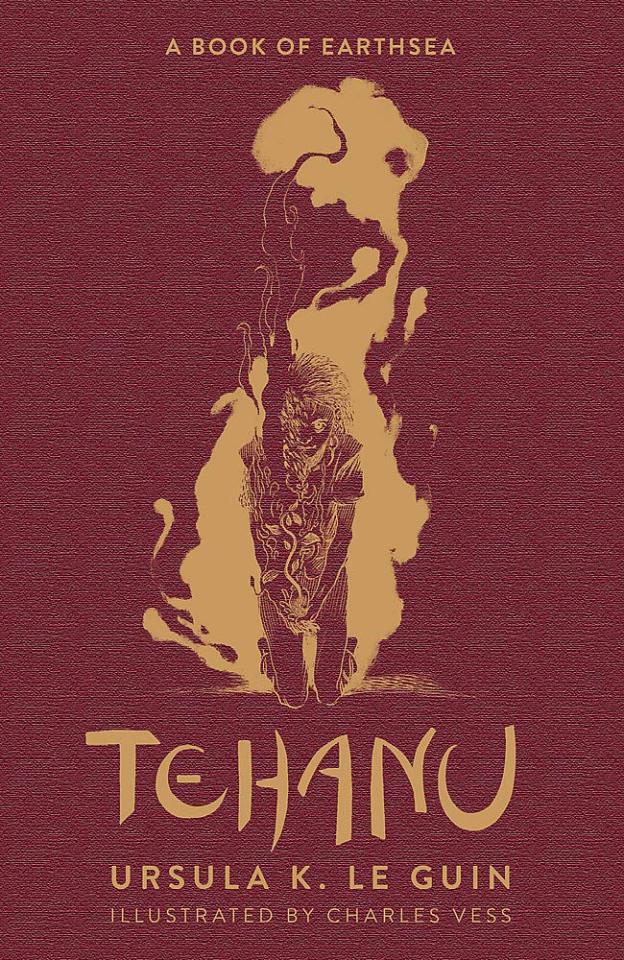
Title: Tehanu (Earthsea Cycle #4) (1990)
Author: Ursula K. Le Guin
Genre/Tags: Fantasy, Fiction, Third-Person, Female Protagonist
Rating: 8/10
Date Began: 6/24/2021
Date Finished: 6/30/2021
Decades after The Tombs of Atuan, Tenar decided to settle down and live an ordinary life on the shepherding Isle of Gont. Now a farmer’s widow, she adopts a disfigured and horrifically abused child, who she names Therru. When a giant dragon deposits a grief-stricken Ged at her doorstep, Tenar finds herself in a strange situation as she cares for her old friend and her adopted daughter. But threats from Therru’s past and a malevolent force on the island soon threaten Tenar’s small family.
Despair speaks evenly, in a quiet voice.
Content warnings and spoilers below the cut.
Content warnings for the book: Violence and death. Mentioned murder. Severe child abuse. Descriptions of traumatic injury and disfigurement. Mentions of r*pe, including of children. Trauma, sexism, and ableism are explored in depth.
Tehanu is a much different book than the trilogy that precedes it. Perhaps this is unsurprising, considering the 17-year gap between this book and The Farthest Shore. I’d describe the Earthsea series as “grounded fantasy”. While all of them take place in a magical world, the thesis of each book is universal; the fantasy always comes second. Tehanu takes this idea to an extreme. The story is about everyday life as a common woman in the Earthsea world, with fantasy barely factoring in. The pacing is intentionally slow and introspective, which is something I normally don’t like, but Le Guin is a consistent exception.
Key characters from the previous books make an appearance. Obviously Tenar is the biggest return, absent since The Tombs of Atuan. The Tenar in this book is older and much more mature, having decided to live a simple life in spite of her adventures and accomplishments. Ged returns, but he’s a shell of his former self, as he mourns the loss of his magic and the man he used to be. Even King Lebannen (formerly Arren, the main character of The Farthest Shore) makes a brief appearance, and is quite a palate cleanser after the horrible men throughout the rest of the book.
Probably my favorite aspect of the novel is the fact that these characters stand well on their own without magic to prop them up. Tenar explored the terrifying freedom she won in The Tombs of Atuan; got married, settled down, had kids — but still finds herself at a loss on what to do with her life after her husband dies. Ged is in a similar boat; he’s gone from an almost mythic character to an ordinary man, and like Tenar finds himself at a crossroads in life. Other characters embody this idea of transformation and uncertainty; Therru’s escaped her abusers and now has a loving mother, but what does the future hold for someone with her appearance? Stuff like that.
The idea of metamorphosis and new beginnings is well-trodden. But what makes Tehanu interesting is Le Guin primarily examines this with the middle-aged characters. Tenar and Ged are legendary figures in the world of Earthsea, but life has taken them to an uncertain future. The thrust of the novel lies in finding a purpose and becoming someone new. I also like that Tenar/Ged is endgame; I got Vibes from The Tombs of Atuan, but neither character was in a position where it would work. Seeing them form a romantic relationship much later in life is touching and cute. But it’s not the reason that either of them grow as people; finding one’s purpose is something one has to do on their own. Their relationship only develops once both parties have done so.
My main complaint about A Wizard of Earthsea, the first book, is the sexism inherent in the setting, which is never examined below the surface level. Perhaps Le Guin’s outlook changed, or perhaps the publishing environment did, because often Tehanu reads like a response to this criticism. The central theme of the book is misogyny, the patriarchy, and its debilitating effects on women. Le Guin examines everything from micro-aggressions (“common wisdom” that happens to paint women as inferior) to domestic issues (“women’s work” and how much that actually is) to outright sexual assault (both in threats and actual acts; it is heavily implied this is part of the abuse Therru endured). She even goes into how powerful women are only considered as such because a man gave them that power.
While I appreciate the fact she addresses these issues in such a frank, blatant way, at times reading Tehanu felt like reading a basic feminism primer. These subjects are all things I’m familiar with, and I feel like anyone who’s studied key feminist ideas would be aware of them also. Maybe 1990 was different? Le Guin doesn’t add any insights to the bleak reality of patriarchy and sexism, which is a little disappointing compared to previous books. That being said, this book is aimed at young adults despite its dark subject matter. Tehanu could be the first exposure to these ideas that many children receive; looking at it that way, it makes sense that the analysis comes off as basic.
I also found the book’s examination of gender to be very cishet-normative. That’s definitely not surprising, considering the book was published in 1990, but to a 2021 reader this hasn’t aged super well. There’s a lot of discussion about the relationships and differences between men and women--whether there are any or not, how magic differs between them, the ability to bear children, and so on. There’s a weird sexual component to this, like how wizards (who are exclusively men) have to remain celibate in order to… keep being wizards? But women who are witches don’t have to do that, and that’s an advantage women have? (There’s mentions of male witches too, iirc, but it’s not expanded upon— do they have to remain celibate? Who knows.). I found this whole bit pretty odd and unnecessary, although I realize a lot of my perspective on the matter comes from a modern view of sex and gender (and, y’know, being trans). Not all the gender takes in the book are bad, but they are limited.
I found Le Guin’s exploration of trauma and ableism through Therru to be more interesting. There’s a lot of examination about how society treats Therru, a survivor of unspeakable abuse. Her trauma is visible due to severe burns along part of her body, leaving her with a missing eye and disfigured hand. Tenar spends much of the novel wondering what future Therru has; no matter how capable she is and how much she acts like any other little girl, strangers gawk at her, or assume she “deserved” what happened to her. Therru becomes happier and more independent over the course of the novel, but relapses into a traumatized state when she encounters one of her abusers. As a survivor, it’s heartbreaking and distressingly realistic. As much as I like Tenar, I almost wish the novel was from Therru’s perspective (other than the brief jump at the end), but I realize it would spoil the ending.
I’m torn on the ending because, while I thought it was cool and had some interesting revelations, it’s a jarring tonal shift. As I mentioned, Tehanu is a slow novel with a heavy focus on everyday life, and the trials and tribulations both Tenar and Therru experience. There’s even a climactic event a few chapters before the end; the only thing left is a persistent loose thread from earlier in the novel. That subplot explodes to the forefront a bare chapter and a half before the end of the book, and a lot of action-y fantasy stuff happens. It doesn’t come out of nowhere; it’s set up throughout the novel, but it is sudden.
That being said, I do like that the subplot with dragons vs humans is hinted at as early as The Tombs of Atuan. When Tenar tells the legend about the origin of dragons early in the story, my mind immediately went to that one room from the Labyrinth with the sad winged humanoids painted on its walls. I’m curious if there are hints elsewhere in the series. I also figured out Therru’s true name and how she relates to that subplot based on context clues. While it’s not a shocking twist, it is a satisfying one. Though parts of it gave me a “magical destiny” vibe which is counter to much of the series so far; I do wonder how the last two books will address this. (Also… did Le Guin imply Kalessin is Segoy? AKA God? What did she mean by this. So Ged literally like… hitched a ride from God, who promptly yeeted out of the story until the end? That’s kind of funny. Maybe I misinterpreted something.)
I probably sound critical of this book, but I did genuinely enjoy it. It just didn’t speak to me the way the previous two did. The next book is a short story collection before the conclusion to the series, so we’ll see where it goes! Tehanu set some stuff up that I expect will be expanded upon in these volumes.
14 notes
·
View notes
Text
Why Isn’t “Mass Shooter” a Modern Horror Monster?
Horror reflects the anxieties of the culture that produces it. In the 1950s, we got monster movies about radiation-mutated creatures and invaders from beyond the stars, mirroring our Cold War Science fears.
In the 1970s, as “Women’s Liberation” and birth control went mainstream, we see an influx of horrors settled on childbirth and children and family dysfunction.
And as the 70s bled into the 80s, while real-world serial killers were leaving behind trails of victims, the masked psycho was dominating the field with countless slashers.
But now -- throughout the 2010s -- mass shootings loom large our our collective American consciousness. Hardly a week goes by without hearing of one somewhere, and they inspire fear and terror. Yet we haven’t seen them show up to dominate horror media in the way serial killers do -- what’s up with that?
Horror-media discussion about gun violence under the cut!
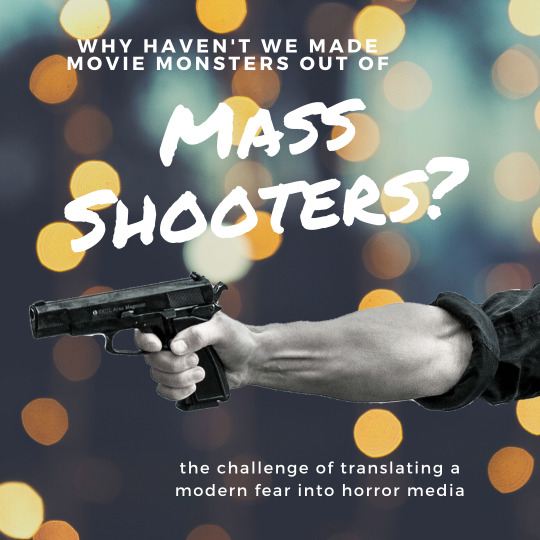
Before we get started, a caveat: There is media about school shootings. It’s just not usually horror. Most, as you can see from IMDB, is family drama: https://www.imdb.com/list/ls070532039/
And none of them are really particularly mainstream, not in the way we associate with slasher films.
So what’s the difference? Why is a killer with an axe more compelling as a film monster than a killer with a gun?
Some hypotheses:
Primacy: Because mass shootings are frequently in the news/public discussion, it’s always “too soon” - the real-life horror is too horrifying for entertainment. Sounds good on paper, but why isn’t that true for slashers? Those movies were popular when serial killers were at their most active.
Politics: Perhaps political motives are influencing the market. Since gun control is a contentious topic, maybe some powers are motivated toward censorship. But wouldn’t that also censor the family drama type movies? Why would it focus on horror especially?
Logistics: It’s just really hard to make a good horror movie about a mass shooting. Guns kill people pretty quickly and indiscriminately, so you lose the mounting suspense and intimacy of a killer with a knife and other similar horror/slasher conventions.
This last point, I think, bears some further consideration. The more I think on it, the more it seems that the things that make gun violence especially horrifying in real life are also things that make it very hard to put in a horror story:
Mass shootings happen, obviously, in mass. Most horror formulas require characters to be isolated and picked off one by one.
Guns kill people in ways that are impersonal and swift. If you’re killing a stadium of people with an automatic weapon, it’ll take just a few minutes. You can’t stretch that out into a long, lingering torture sequence or whatever.
Gun violence is indiscriminate. Wherever a crowd gathers, a shooter can start killing people. There’s no space for, say, the “horror rules” re: jock, slut, virgin, etc. because morality doesn’t play into it.
A killer methodically making his way through a sorority house, killing its members one by one lends itself more naturally to suspenseful storytelling than a gunman opening fire on a crowd. A killer leaving clues and taunting detectives lends its own narrative structure.
In that regard, it’s pretty obvious: We cannot make a slasher-style film or a torture-porn film about a gunman. It just won’t work.
But perhaps we’re looking at it all wrong. What if we viewed the mass shooter not as a serial killer, but as a force of nature? The disaster movie genre has ample cross-over with horror, and the general formula would work well for a mass shooter:
Introduction to a wide cast of characters as they maneuver into a vulnerable position
The disaster hits, and we move between individuals affected by the calamity, watching their initial reactions
In the ensuing chaos, characters attempt to escape further danger
The danger passed (for now?) some characters manage to survive, now irrevocably changed
Whether the disaster in question is an earthquake, a sharknado, or a school shooting, that formula should work. The key to success lies in the pacing and the large cast, allowing you to stretch out a relatively brief event into a detailed and tense narrative.
So why haven’t we seen that? Outside of, like, one made-for-TV movie I recall watching in the 90s, this presumably straightforward premise hasn’t gained much traction.
The Making of Monsters: Signs and Signifiers
Perhaps the real reason we haven’t seen a lot of horror stories about mass shootings is because there is already so much mythology and symbolism tied to these sorts of narratives, and that symbolism is at odds with the creation of movie monsters.
Guns carry a tremendous amount of cultural significance and baggage, at least in the United States. It’s why they’re so politically contentious. And when something is already heavily laden with symbolic meaning, it’s hard to turn that symbolism into something else in a way that will stick.
Point #1: Guns are a great equalizer. Unlike a knife or sword, skill doesn’t matter all that much when it comes to killing somebody with a gun. You don’t have to be strong or fast or have a ton of training. You just have to point it and pull the trigger -- if you do that enough times, and at a big enough target, you’ll probably hit something. This means that anyone can kill someone with a gun: a skinny nerd, a young child, a petite woman. Guns are the thing that give you, the underdog, a way to compete against them, the big strong enemy.
This leads to Point #2: Good Guys With Guns(tm). As absolutely anyone who has been on the internet for five minutes after Any Sort Of Bad Event will tell you, Bad Things can be stopped by Good Guys With Guns(tm). And while you can debate the merits of armed civilians protecting a group from harm against an active shooter, it’s impossible to deny that, historically, good guys have been armed. Police, military, armed militias, frontiersmen, etc. carry weapons. Which means that “guy with a gun” does not immediately translate, visually or thematically, as “threat” in the same way as wielding a butcher knife in a non-culinary context. A guy with a gun could, at a glance, be a good guy. A guy with a big knife is obviously a villain. Similarly, the Good Guys With Guns(tm) bleeds over into the horror genre. What would the zombie apocalypse be without headshots? How many horror franchises could have been cut short if someone had just shot the killer?
Finally, Point #3: Guns in media have special powers. Gun mythology in film and television is well-developed, with its own set of tropes and expectations. In movies, pointing a gun at someone will automatically make that person comply with whatever you ask them to do -- we even have vernacular about this, “nobody put a gun to your head” -- as if the gun were somehow more powerful than a simple threat and could in fact control behavior. Often, people who are shot in television politely fall over and die quietly; it’s a civilized end, without all of the screaming and thrashing (never mind where they’re shot or what that would would do in real life). And there are so many types of gun. We have a whole video game genre dedicated to it -- collecting guns, learning their various abilities, applying them situationally to achieve various goals. With so many established tropes, writing anything with new tropes and rules runs the risk of generating confusion, disbelief and even hostility in an audience.
So, with all of that in mind, it starts to become clear:
Writing a horror story about gun violence is difficult because guns carry so much mythic significance, and it’s impossible to write about them metaphorically while keeping it clear what that metaphor is.
If I write a story about an atomic-powered lizard who destroys a Japanese town with radiation, it’s easy enough to see that it’s a metaphor for nuclear warfare. But there is no similarly straightforward metaphor for gun violence readily apparent.
But it’s tougher even than that -- because guns themselves aren’t the only thing to have been mythologized.
The Myth of the Lone Gunman
Remember: Guns are the great equalizer.
This knowledge sits in the foundation of storytelling, not just in the fiction we make up but in the way we build narratives around mass shootings in the real world. There are certain tacit assumptions we make about gunmen that may or may not be accurate.
We have a certain narrative framework in place to explain school shootings, for example: The awkward, isolated young man who is bullied until he finally snaps and goes on a killing rampage.
Never mind that this narrative is not wholly supported by facts. It may be true in some cases, but certainly not all. And yet, go back up to that list of mass shooter movies on IMDB and look again at what the majority of them have in common.
This is problematic because, from a mythic perspective, people who are bullied and then stand up to their oppressors are heroes.
In Carrie, when Carrie White destroys the school after being humiliated on prom night, we’re on her side. It feels good to watch her kill all those people who were awful to her. It feels just and righteous and imminently satisfying.
When Spartacus leads a slave revolt, we cheer. When Daenerys Targaryen kills all the masters and uses their heads as mile-markers, we feel triumphant. When Arthur Fleck shoots the smug talk-show host on live television, we think, Well, he had it coming.
Oh, sure. We pay lip service to being horrified. And these dark heroes might die at the end, receiving some karmic retribution for the price of their revenge. But can you say, truthfully, that you have ever once watched a story about an underdog killing his bullies and felt sorriest for the bullies?
So: This is the problem with our cultural narrative about the school shooter. Purposely or not, it puts the shooter in the role of hero.
And not only is that irresponsible, it’s just downright inaccurate.
When Stephen Paddock opened fire on a concert and killed 58 people, he was not firing back at his oppressors.
When Omar Mateen shot up a night club in Florida, he wasn’t getting revenge against his bullies.
When Adam Lanza slaughtered 26 people at an elementary school -- 20 of them young children -- he obviously was not giving his victims what they deserved.
In the real world, mass shooters might be motivated by political ideology and a desire to promote fear -- ie, terrorism. They might be unhappy with some aspect of their lives and decide to “punch down” at a vulnerable group in the worst possible way. They might be looking to become the heroes of certain media narratives, to secure some kind of fame or notoriety. They might want to kill themselves in a way that hurts a lot of other people at the same time. There are lots of reasons why people might commit mass murder.
But the important thing is that the victims are, overwhelmingly, not bullies and oppressors. They are people. Just innocent people in the wrong place at the wrong time. Because mass shootings aren’t really about personal vendettas; they’re about mowing down a bunch of strangers in a few minutes at an impersonal long range.
So here’s my final thought on the topic: We SHOULD tell horror stories about mass shootings.
It’s a topic that’s timely, and it’s a scenario that’s frightening. There’s no reason not to tell these stories. But to make it work -- on a logistic and socially responsible basis -- we need to change our treatment.
Going back to the “disaster movie” idea: It’s time to treat mass shooters in fiction as forces of nature, as oblivious and blindly destructive as a hurricane. It’s time to center the focus on the victims. Never mind the killer and what led him to this moment. Let’s take a minute to think about the people caught in that situation -- the people who fear for their lives, who try to help one another, who fight or flee or hide once the first shot is fired. Let’s write about the moments of humanity shared by two strangers crouched behind something while shots fire all around them. Let’s write about the horror of having your perfectly normal, mundane day suddenly and irrevocably shattered by a stranger with a gun.
There is horror there, real horror, that can be mined and cultivated and turned to art. And it seems to me that embracing that, and shifting the cultural narrative away from valorizing the lone gunman, would be good for art and society.
Are you ready to tell that story?
I am.
#horror#horror media#horror movies#how to write horror#horror stories#gun violence#mass shootings#trigger warnings#long post#Deep dive#horror analysis
73 notes
·
View notes
Text
BECAUSE I’M NOT POPULAR, I’LL READ WATAMOTE: CHAPTER #123
Just when you thought we had too many characters in Tomoko’s new class, Nico Tanigawa goes ahead and adds another person to 3-5...at least for one day. Ever since that chapter when Tomoki first ran into his sister’s circle of friends, I was wondering if we would ever expand on that to the point where Tomoki might officially meet them (exchange introductions and whatnot). Suffice to say, that kind of development seems very possible after a chapter like this.
Chapter 123: Because I’m Not Popular, I’ll Invite My Brother to 3-5
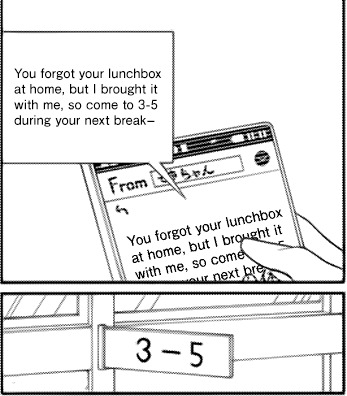
As I recall, this isn’t the first time Tomoki has forgotten his lunch (refer to chapter 83). I suppose that for being a responsible soccer star, the mangaka wanted to give Tomoki more plausible flaws (besides being a perpetual scowler). I think something like being forgetful works here, because not only does it make Tomoki more relatable, it also highlights Tomoko’s more concerned, “older sister” side. It’s easy to forget that for all her shit-talking, Tomoko does look out for him.
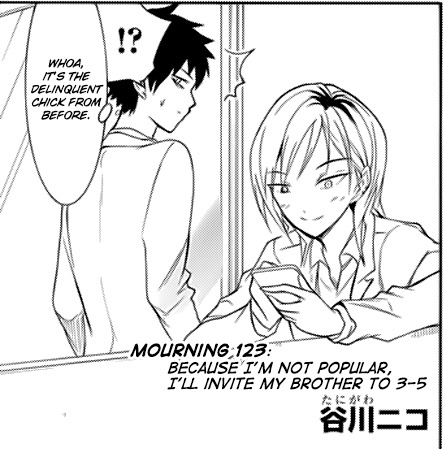
I wonder, did Tomoki really refer to her as a “chick”? It’s a minor grievance, but the difference does say quite a bit about Tomoki’s character. The term “chick” connotes a sense of misogyny for some people, but that doesn’t seem to be Tomoki at all, especially since in previous chapters he’d use words like “girl” instead. Hmm...
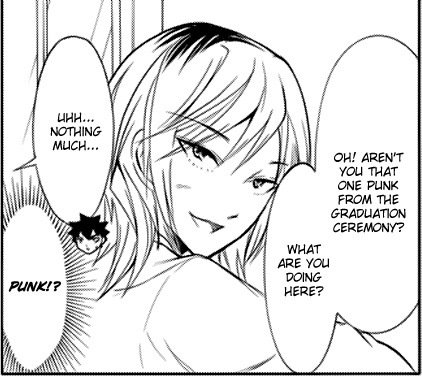
Honestly, as heartwarming as Yoshida’s smile is, I’d be lying if I said it kind of freaked me out a bit. I can’t recall any other time that Yoshida had a smile as big and as genuine as this, that for a second, I thought it might’ve been a different character. Perhaps it’s fact that a smile like this isn’t going to last very long, especially for someone who switches gears at the drop of a hat like Yoshida.
Funny enough, I love how Yoshida’s emotional state doesn’t really change the way she talks. In this case, she still has the nerve to call Tomoki a punk, which she’d probably still do if she were in a more sour mood. Basically, all of her dialogue here could be copy-and-pasted if Yoshida were feeling more confrontational.
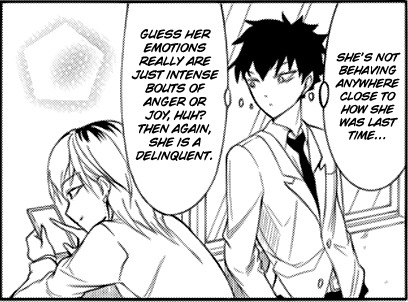
I’ve been seeing people accuse Tomoki as being just as judgmental and rude as Tomoko is, but I don’t think that’s really being fair to the guy. We’ve all had moments where we would quietly make unfair judgments on people we just met, but most people have the decency to not be vocal about it until proven wrong or right. It’s different from Tomoko, whose filter seems to fluctuate between on and off at the worst times. Tomoki is only human, after all.

So there’s going to be another field trip arc in the future, huh? Now I’m REALLY excited. I wonder what we can expect from it, given that the first field arc was Tomoko’s first major turning point. Will there be a big fight between Tomoko’s friends (Yuri vs Minami), or perhaps Ucchi will confess to Tomoko on the ferris wheel (not happening)? I’m sure Yoshida will have a huge role, though. Maybe she’ll have her dreams shattered and Tomoko will try to comfort her and fail spectacularly.

If you thought being in a different class could stop Ucchi...
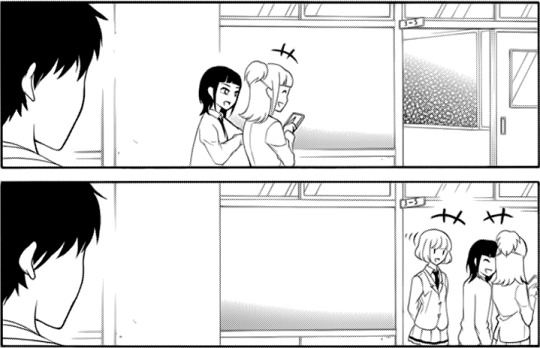
...you were so, so wrong.

Ucchi being a stalker is nothing new at this point, but there are a few things pull apart from this seemingly simple gag. For one, it’s not just Ucchi’s action that makes for a laugh–it’s her demeanor, too. She goes into the classroom with a smile, and comes out with a smile. Obviously, the latter is her trying to keep face in front of her friends, but there isn’t a twinge of hesitation in her actions. She must really be going for her.
But the other, somewhat more depressing part of this joke is how Ucchi’s friends apparently didn’t even notice she was gone for three seconds in another room. We’ve had hints before that Ucchi was the outsider amongst her circle of friends, but did you notice how Ucchi effortlessly re-inserted herself into the conversation? It suggests that Ucchi’s done this several times before, and she’s gotten used to being excluded. Poor Emoji-girl just wants to be noticed.
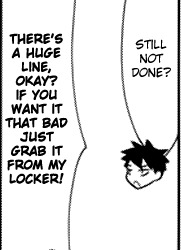
It’s not everyday that Nico Tanigawa gives us little tidbits to remind us that Tomoko is a girl, with all the issues that come along with it (for those who don’t know, women’s bathrooms often have long lines because they aren’t designed to fit the cumbersome routines women go through just to relieve themselves). Any time Tomoko’s gender is directly brought up, it’s usually in a sexual context, but this here is just an everyday issue about being a girl. I wonder if the artist had any input on this...

So I’m guessing that’s Emoji-girl 2.0′s shtick is that she’ll be doing all of these really impressive feats in the background, yet we won’t learn a single thing about her personality-wise. A gag character at its finest.

Cute.

It was only a matter of time before these two met each other.
Yuri sure has come a long way in regards to how she treats Tomoko. I doubt that if this was right after the field trip arc, she wouldn’t have bothered to confront someone rifling through Tomoko’s locker. Maybe she’d tell Tomoko later, since that’d be the passive choice, but that’s definitely not the case now. Ever since Yuri admitted that Tomoko is her friend, she’s noticeably been more considerate of her.

And pray tell, Yuri, what did you expect Tomoko’s brother to be like? We’re you expecting someone just as crass, weird, and idiotic like the sister? That’d be a reasonable assumption if all you’re going on is Tomoko herself. But speaking as someone with a sister who is very much different from myself, siblings being polar opposites are a lot more common than you might think, Yuri.
Wonder why Tomoko is particularly happy about her brother stopping by? I’d assume that she thinks her relationship with the popular Tomoki would make her look more popular by comparison, but popularity hasn’t been a goal of Tomoko’s as of late. Maybe she just wanted to freak out Komiyama...
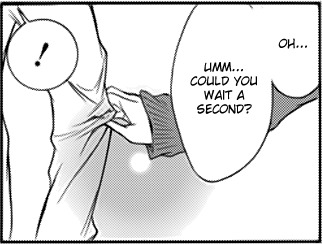
Oh snap, she’s doing the sleeve grab! This is such a shoujo manga move, complete with the highlight and everything, that you cannot tell me that the mangaka doesn’t know the implications here.
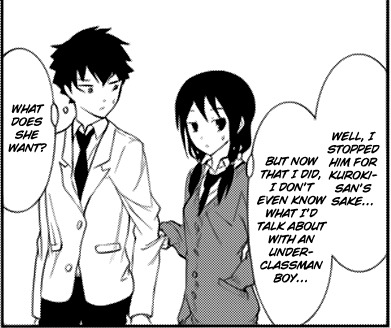
I think this the first time we’ve seen Yuri act without fully thinking things out first, and it’s kind of amazing that someone like Tomoko is actually encouraging her to be a little more bold, though not to a degree Yuri can handle yet. We’ve already seen just how far Yuri is stepping out of her comfort zone to maintain her friendships, but I suppose forcing a conversation is not quite her speed yet. Baby steps, Yuri.
I guess now is as good a time as any to address the elephant in the room that is the YurixTomoki ship. Do I think it could work? In all honestly, I think it could. We really don’t know anything about Tomoki’s taste in girls, if he has any. But if the less than pleasant reactions he’s had to Tomoko, Komiyama, and Yoshida are anything to go by, he probably wouldn’t want someone vulgar, creepy, or challenging respectively. Likewise, we don’t know anything about Yuri’s taste in guys, if one exists. But I think it’s a safe bet that she wouldn’t want to deal with someone aggressively outgoing. That being the case, my only argument for them is that Tomoki and Yuri would likely be a very easygoing relationship if the ship were to start sailing.
Comedy-wise, I think the possibilities for Komiyama and Akari’s despair, and Tomoko being the awkward third wheel are endless.

It’s always funny to see how easily Komiyama can go from being the sensible one to being the dunderhead when the circumstances are just right. Most of the time, she’s the straight woman to Tomoko’s idiocy, but whenever baseball or especially Tomoki are concerned, she ends up being more of a fool than Tomoko. I’m not even annoyed that she insulted the best girl, since it’s obvious Komiyama is just thinking on impulse, and her words are only that of a jealous lust-filled admirer who needs to deny the possibility that Tomoki could be interested in any other girl besides her. You can be such a lovable bitch at times, Komiyama.

Komiyama sure is channeling her inner Tomoko, isn’t she?
I see the writers took the time to capture Yuri letting go of Tomoki’s sleeve. We have no clue whether Yuri knows what’s going on between Komiyama and Tomoki, despite Komiyama being an open book. It’s probably just a throwaway action, but I’d like to think that Yuri is aware of how it must look for a girl to cling onto another guy, and wanted to avoid looking like she had a relationship with Tomoki lest Komiyama get the wrong idea.
And yes, Tomoko’s friends truly are “the crazies” now, huh? To think that group used to be a population of one, aka. Tomoko.

One thing that’s been on my mind is what Tomoki actually thinks about Komiyama? We already know he views her as some kind of “pure pervert”, but it’s still up in the air whether he finds her truly repulsive or not. He likely has some inkling that Komiyama has a crush on him (he ain’t no oblivious MC), but probably doesn’t intend to reciprocate those feelings any time soon. At this point, he’s probably deliberately avoiding her just to keep from being sexually harassed again. But now that he’s been confronted, he’s got to throw her a boner.

Good gracious, this woman needs help.

I’m noticing some confusion at this line, and while I myself can’t adequately explain the inner workings of the female body, I think the important thing to understand is what this reaction means about Komiyama.
Whether or not Komiyama’s period actually happened is not what matters here. The overall impression is that Komiyama had such an immense reaction to Tomoki that it literally sent her sex drive on overload. One interpretation is that her hormones raged so bad that it jump-started her period. But what I personally think happened is that Komiyama had a “climax” and is using a period as a coverup. Either way, Komiyama truly is the most depraved girl in this manga.
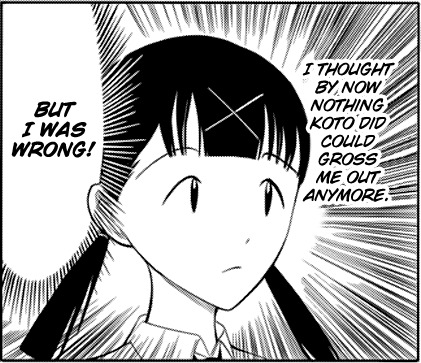
The only girl that could outdo Yuri in the tsukommi department.
Now I’m curious as to how Komiyama and Itou met. Even better, how exactly did Itou see past all of Komiyama’s grossness to eventually become her friend? I’d imagine that the circumstances mirror Tomoko and Yuri’s relationship in some way.
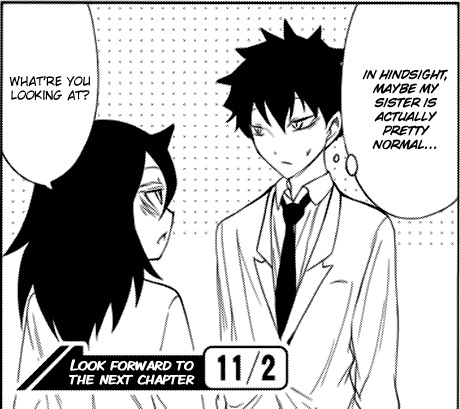
And this is why relativity matters, folks. Even for us readers, Tomoko at the start of the series always seemed to be the abnormal one, but that was only because for a while, she was the only character we really got to see, which made everyone else look hyper-normal in comparison. So yes, Tomoki, your older sister actually is pretty normal...relatively speaking.
You know, I was worried that Tomoki, being the sole recurring male of this manga, would get sidelined in favor of all the new female characters. But thankfully, that doesn’t appear to be the case. Tomoki’s role in this story was initially that of an observer, a audience surrogate who could join us in reacting to Tomoko’s antics. But even that couldn’t last, so I guess the mangaka has been trying to find some way to characterize him even further. For now, it seems that Tomoki may soon find himself being more involved in Tomoko’s social circle. Just don’t steal your sister’s harem now.
So what do you suppose Tomoki’s role we be from this point on? Will he be characterized beyond having a desirable dick? Will a hidden dorky side bubble up to the surface? Or will his heart grow three sizes someday? But even if he stays in the background, I’ll always have certain fondness for the guy. Why?
Cuz he has not once, ever raised the siscon flag.
#watamote#watamote review#no matter how i look at it it's you guys' fault i'm not popular!#chapter 123#tomoki kuroki#masaki yoshisa#ucchi#potential-san#yuri tamura#kotomi komiyama#itou#review
24 notes
·
View notes